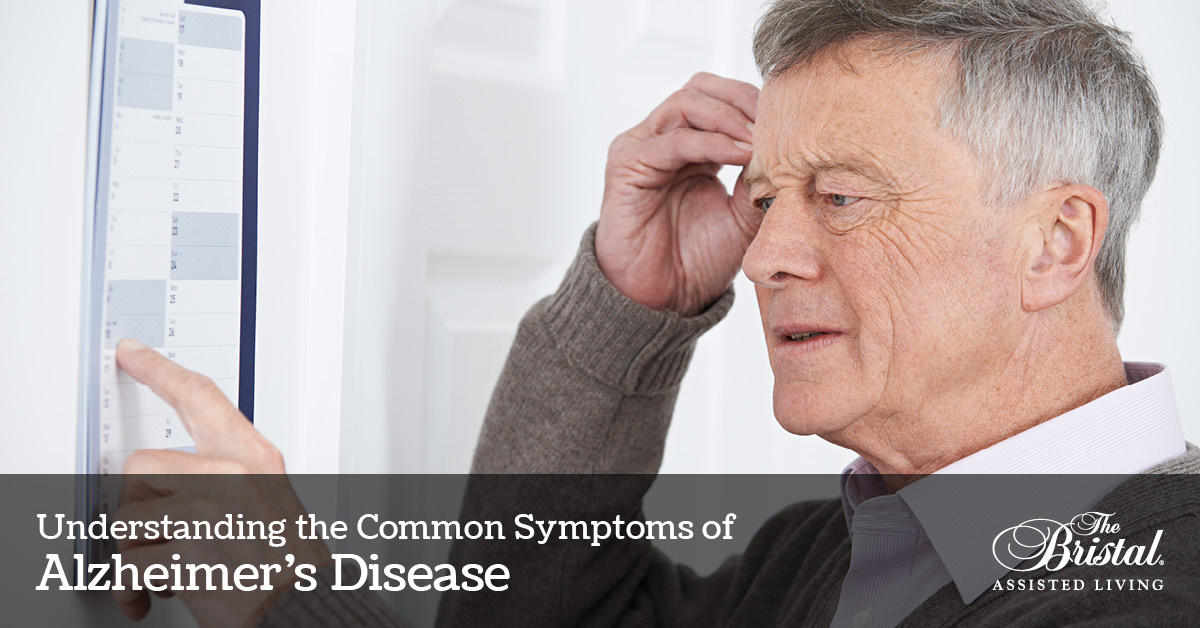Alzheimer’s disease causes changes in the anatomy of the brain, which leads to declining mental functioning and memory loss. The range of symptoms, and the rate at which they progress, vary from person to person. Alzheimer’s disease is not a normal part of aging. In the early stage of Alzheimer’s, the patient or people around him or her may notice changes in cognition. Most people can do things to compensate for cognitive deficits in the early stages.
It’s always important to consult with a medical professional and receive a proper diagnosis when deficits in cognition are noted. Some types of dementia, such as those caused by drug interactions, depression or other reasons, can be treated, relieved or even reversed. While this, unfortunately, is not the case with Alzheimer’s, getting a diagnosis is crucial so that one can make a plan to get the right kind of care.
Symptoms of Alzheimer’s
Difficulty in remembering newly learned information is the most frequent early sign of Alzheimer’s. This is due to the changes in the brain that make it physically unable to form and retain new memories. As the disease progresses, more memories are lost. At this point, the person may only remember memories from the more distant past, but eventually, even childhood memories may be gone.
Apart from memory challenges, other symptoms may be present in the early stages of Alzheimer’s, including:
- Communication difficulties, such as being unable to find words
- Getting lost in familiar places
- An increase in feelings of confusion, fear, anxiety or loneliness
- Mood or personality changes
- Lessened ability to concentrate
- Poor judgment
- Difficulty with planning and carrying through tasks in the proper sequence
- Making mistakes in tasks you’ve always done effortlessly
As Alzheimer’s progresses, the symptoms increase in severity, and may include:
- Disorientation, mood and behavior changes
- Deepening confusion about events, time and place
- Unfounded suspicions about family, friends and professional caregivers
- More serious memory loss and behavior changes
- Difficulty speaking, swallowing and walking
Behavioral Changes
The behaviors of people with Alzheimer’s can be emotionally challenging to experience, to witness, and to address. As the disease progresses, it’s crucial that loved ones offer understanding — as well as productive help — so that the deficits and emotional challenges of living with Alzheimer’s disease can best be handled. The main behavioral changes include:
- Aggression, both verbal and physical, can be due to pain or fatigue, environment, medication side effects or communication problems. It’s important to always keep in mind the fact that the person with Alzheimer’s cannot help his or her behavior. It may arise from a particular frustration or have no apparent cause.
- Agitation arises when people with Alzheimer’s are biologically experiencing a decreased ability to absorb new information and cope with their surroundings. It can also arise from certain medical conditions, fatigue, changes to the environment or personnel, or other factors giving rise to fear, anxiety or frustration.
- Depression is common in the early and middle stages of Alzheimer’s disease as the individual is aware of diminishing mental functioning. Depression may be hard to diagnose because the symptoms may overlap with those of Alzheimer’s. These symptoms should not be ignored; a physician can diagnose and prescribe treatment that may help relieve them.
- Confusion is a common symptom in Alzheimer’s, when a person with the disease may cease to recognize familiar people, surroundings or the passage of time, as well as the purpose of common household items, such as pens or spoons. Confusion can occur in varying degrees of severity and is especially common after a change in living situation or daily routine.
- Hallucinations, in which a person perceives things that are not physically present, is a common symptom of Alzheimer’s disease, involving any or all of the senses of seeing, hearing, tasting, smelling and feeling. Hallucinations can be frightening to the person having them, though not always — sometimes they are a return to the past.
- Sundowning occurs when a person with Alzheimer’s experiences problems with sleep and/or cognition. These problems may worsen at dusk and can persist all night. Some 20% of people with Alzheimer’s are estimated to suffer increased symptoms of confusion and agitation that begin late in the day, according to the Alzheimer’s Association. Others may have restless nights of broken sleep.
- Wandering affects 60% of people with dementia, according to the Alzheimer’s Association. Anyone with Alzheimer’s who can walk is susceptible to wandering and getting lost, due to the potential inability to remember his or her name, home address or the route to return home. Those who speak about wanting to go home even when at home, or who cannot locate the kitchen, bedroom or the bathroom within their own residence, are more likely to wander.
It’s important to learn as much as you can about Alzheimer’s disease, participate in making a comprehensive plan for your immediate future and take advantage of the assistance and coping support that may be available in your community. Early diagnosis and intervention methods are improving all the time.



